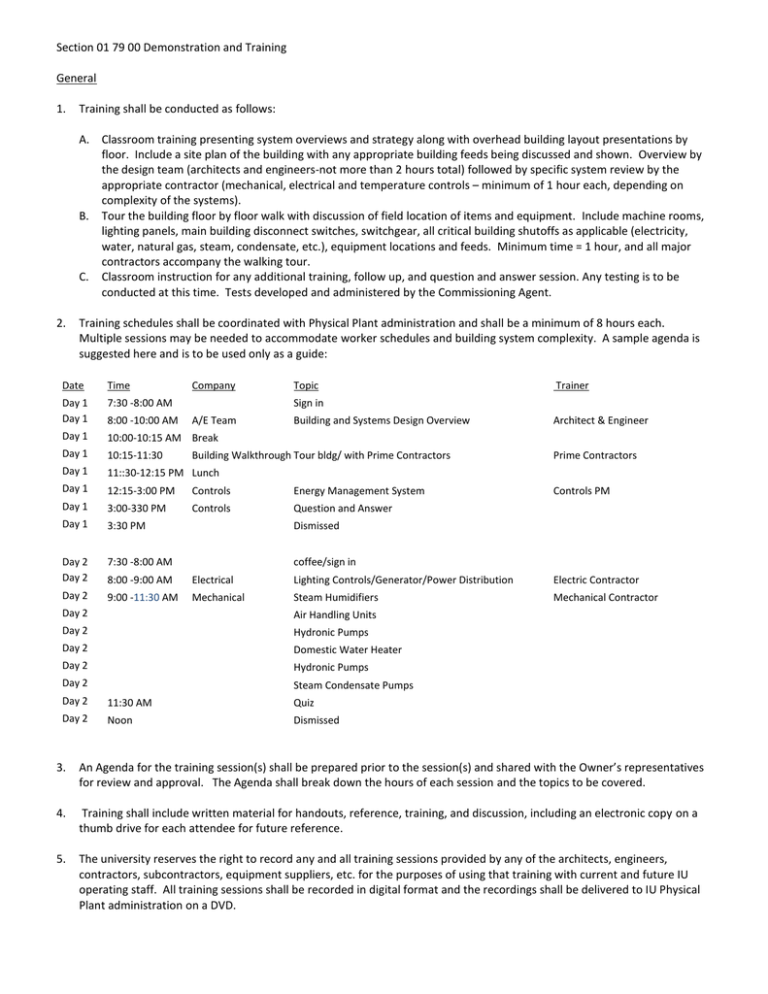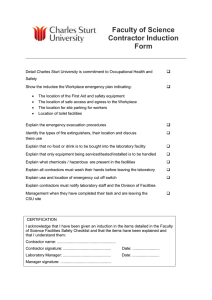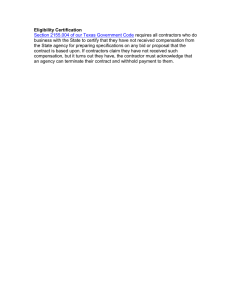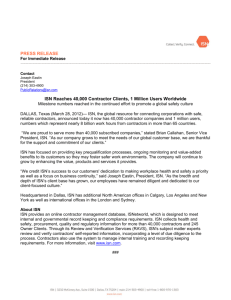Section 01 79 00 Demonstration and Training
advertisement

Section 01 79 00 Demonstration and Training General 1. Training shall be conducted as follows: A. Classroom training presenting system overviews and strategy along with overhead building layout presentations by floor. Include a site plan of the building with any appropriate building feeds being discussed and shown. Overview by the design team (architects and engineers-not more than 2 hours total) followed by specific system review by the appropriate contractor (mechanical, electrical and temperature controls – minimum of 1 hour each, depending on complexity of the systems). B. Tour the building floor by floor walk with discussion of field location of items and equipment. Include machine rooms, lighting panels, main building disconnect switches, switchgear, all critical building shutoffs as applicable (electricity, water, natural gas, steam, condensate, etc.), equipment locations and feeds. Minimum time = 1 hour, and all major contractors accompany the walking tour. C. Classroom instruction for any additional training, follow up, and question and answer session. Any testing is to be conducted at this time. Tests developed and administered by the Commissioning Agent. 2. Training schedules shall be coordinated with Physical Plant administration and shall be a minimum of 8 hours each. Multiple sessions may be needed to accommodate worker schedules and building system complexity. A sample agenda is suggested here and is to be used only as a guide: Date Time Day 1 Day 1 7:30 -8:00 AM Day 1 10:00-10:15 AM Break Day 1 10:15-11:30 Day 1 11::30-12:15 PM Lunch Day 1 12:15-3:00 PM Controls Energy Management System Day 1 3:00-330 PM Controls Question and Answer Day 1 3:30 PM Dismissed Day 2 Day 2 7:30 -8:00 AM coffee/sign in 8:00 -9:00 AM Electrical Lighting Controls/Generator/Power Distribution Electric Contractor Day 2 9:00 -11:30 AM Mechanical Steam Humidifiers Mechanical Contractor 8:00 -10:00 AM Company Topic Sign in A/E Team Building and Systems Design Overview Building Walkthrough Tour bldg/ with Prime Contractors Day 2 Air Handling Units Day 2 Hydronic Pumps Day 2 Domestic Water Heater Day 2 Hydronic Pumps Day 2 Trainer Architect & Engineer Prime Contractors Controls PM Steam Condensate Pumps Day 2 11:30 AM Quiz Day 2 Noon Dismissed 3. An Agenda for the training session(s) shall be prepared prior to the session(s) and shared with the Owner’s representatives for review and approval. The Agenda shall break down the hours of each session and the topics to be covered. 4. Training shall include written material for handouts, reference, training, and discussion, including an electronic copy on a thumb drive for each attendee for future reference. 5. The university reserves the right to record any and all training sessions provided by any of the architects, engineers, contractors, subcontractors, equipment suppliers, etc. for the purposes of using that training with current and future IU operating staff. All training sessions shall be recorded in digital format and the recordings shall be delivered to IU Physical Plant administration on a DVD. 6. Handouts to each trainee shall include laminated 11 X 17 copies of the 1-line diagrams for the heating hot water, chilled water, air handling, domestic water, and power distribution systems. Handouts shall also include the HVAC control drawings (11 X 17 non-laminated) and sequences of operations in narrative format. 7. 20-25 question quizzes shall be given at the end of each daily session and shall be prepared and administered by the presenter. Trainees are expected to achieve an 80% success/pass rate. 8. IU Physical Plant administration will assist with the facilitation of the training. Prior to scheduling any training, the Contractor shall contact the Physical Plant administrative offices at 812-855-1763 and request a meeting to schedule any training. 9. Main systems that should be scheduled with the Physical Plant administration so that appropriate craft people can attend are (but not limited to): A. B. C. D. E. F. G. H. I. J. K. L. M. N. Fire Protection System, Alarm Panels, Alarm Limits and Points, Connections. Electrical System (including understanding and setting of VFD’s). Any Specialized Dimming Systems and Lighting Controls. HVAC System (including heating and chilling systems/equipment/towers/etc.). Compressed Air Systems and Equipment. Domestic Hot and Cold Water Systems. Water Purification Systems, including RO, DI, and closed loop treatment. Sanitary Wastewater Systems. Building Controls (including DDC system). Overall Miscellaneous Equipment Operation. Emergency power generation and associated automatic transfer equipment. Access control systems. Security/Surveillance systems. Main Power Distribution, including operation of circuit breakers and/or switches.



